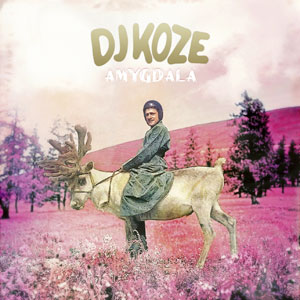DJ Koze Amygdala
It’s been roughly seven years since DJ Koze last put out a solo record and […]

It’s been roughly seven years since DJ Koze last put out a solo record and four years since his notable Reincarnations remix collection was released. In the electronic-music world, this is a substantial amount of time, long enough that his work has possibly been skipped over by the newest generation of club-music converts. On Amygdala though, Koze does not sound like he is waiting for anybody to catch up to him (note the title of opening tune, “Track ID Anyone?,” which seems to be a slight jab at the YouTube/SoundCloud-era of electronic-music consumption), and while this does not make for the most widely accessible of records, the LP is still a highly enjoyable, unflinchingly unique effort that boasts a wealth of musical imagination.
Halfway through his 2005 LP, Kosi Comes Around, the German producer offered up “My Grandmotha,” a jazz-touched effort which existed somewhere between tender microhouse and soulful hip-hop, complete with a bizarre lyrical refrain about a grandmother driving motorcycles in a “chicken house.” In many ways, this production foreshadowed Amygdala, as its mixture of enchanting musical progressions, fluid basslines, and strange vocal twists served as a basic blueprint for the tracks heard here. It seems likely that in the time between his last LP and now, Koze has become less concerned with how his productions may or may not work on a dancefloor. He is surely still making “dance music,” but is doing so while revelling in its unexplored, or even traditionally avoided, corners. In a word, this record is weird. Not weird in the same way as the “outsider house” of L.I.E.S. or the experimental offerings of labels such as PAN; this is somehow more straightforward in its eccentricity. Koze’s tracks are seldom distorted and are far from lo-fi, but the elements he implements and the themes explored—whether they’re stated in the lyrics or merely implied by the mood of the track—can be somewhat uncommon by contemporary dance-music standards. Often times, detuned masses of horns and toy instruments help make up Koze’s wide sonic landscapes, while vocal performances from Matthew Dear, Caribou, Ada, and others sound oddly detached from the music, yet still never seem out of place.
At the same time, even as Koze follows his many unexpected whims during the album’s elongated efforts, he does so on top of some undeniably gorgeous productions. The German artist’s keen sense for musical space and progression is in fine form here—lush, string-like chords sit alongside melodic flourishes that enhance but rarely lead, while irresistible basslines (which pleasantly combine Motown accessibility and funky house drive) draw the listener beyond the more uneasy surface layers, revealing tracks with largely unparalleled musicality and a real sophistication of arrangement. With this in mind, it’s no wonder that Koze is able to conjure up strong performances from his vocal collaborators. On the expansive “Nices Wölkchen,” Apparat’s long-winded, insular delivery sounds completely at home, while Matthew Dear’s layered, ambivalent performances on “Magical Boy” and “My Plans” are pleasantly reminiscent of his best Ghostly outings. On “Homesick,” the soft combination of Ada’s harmonies tells the story of ditching work after being inspired by the sound of a record—all to a wistful, mid-tempo beat—and on “Ich schreib’ dir ein Buch 2013,” Koze works the almost theatrically soaring voice of late German actress/singer Hildegard Knef atop a string-led shuffle, which also includes quite unobstructed glimpses of Marvin Gaye’s “Ain’t No Mountain High Enough.” The instrumental cuts too find ways to weave a bit of eccentricity into the proceedings without losing any of their richness. The interlude-esque “Don’t Lose My Mind” builds a sweet and sunny track from continuously stacked guitar loops and a rotating, half-time beat, while the Milosh-featuring title track that follows is reminiscent of Four Tet’s work with its bell-like melodies, wordless vocal chops, and roomy percussion.
It’s hard not to see Amygdala as a significant record, not only in the legacy of DJ Koze, but also in the current electronic landscape. Without necessarily bucking the trends of today, Koze has provided a complete picture of his truly singular outlook on dance music. To say its “refreshing” or “game changing” would be an overstatement, but that does not mean Amygdala is not a beautifully welcome reminder of how wide the range of electronic-music production can be—especially when it is executed as masterfully as DJ Koze, a seasoned veteran of the craft, does here.

